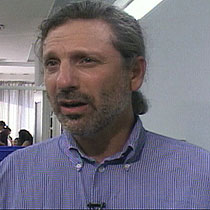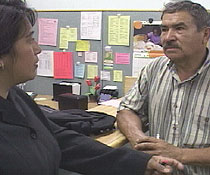2007年VOA标准英语-Lawyers in Montgomery County Donate Time to Fre(在线收听)
By Jeffrey Young
Washington
19 June 2007
To most Americans, the governments in their towns and regional areas, called counties, are the governments they interact with the most. And alongside these local governments are groups of citizens who work on their own to make life better.
In this segment of a multi-part series, VOA's Jeffrey Young focuses on lawyers in Montgomery County, Maryland who help people with limited access to the legal system resolve their problems.
Laws. Regulations. It's all so complicated. How can someone navigate through the system? The Pro Bono legal clinic can help.
In the Washington, D.C. suburb of Montgomery County, Maryland, a lawyers' group called the Bar Foundation has members who donate their time and provide help to people with legal problems.
 |
| Harry Lewis, attorney |
In 2006, more than 2,000 people came to the Pro Bono legal clinic. The words "Pro Bono" are Latin and mean "for the good of" the community.
Attorney Mary Kay Canarte manages the program, which deals with a wide variety of legal issues. "We provide legal assistance in the areas of landlord-tenant housing, debt collection, bankruptcy, family law matters, divorce, [child] custody, [and] alimony requests.
 |
| Mary Kay Canarte provides legal services without charging fees |
"Many of the people who come to our clinics have never spoken to a lawyer before,” she says. “They have absolutely no idea what the laws are. And this is their first opportunity to feel included and know what the laws are what protect their rights."
Jesse Foster says a financial nightmare prompted him to come to the Pro Bono clinic. "I'm here because it looks like I have to file for bankruptcy. But I don't have any money. And I talked to a lawyer about how much it would cost me to file for bankruptcy, and it blew me away [astonished me]. I was told that I could get free legal advice and possibly help from the legal clinic here,” he added.
The Pro Bono clinic also gets requests for help from workers – especially day laborers – who say they were cheated on the job. Attorney David Vega explains. "These employers pick them up [hire them], [and] promise them 15, 12, [or] 10 dollars an hour and wind up paying them nothing for their labor. They wind up having to sue their employer. And that's expensive, so they come to us."
David, like a number of the Pro Bono attorneys, speaks several languages. That is important because a number of people who come to the clinic have little or no skill in English.
The Bar Foundation says that the goal will always remain making sure that everyone in Montgomery County, regardless of income or ethnicity or legal status, has help in resolving their problems and to make sure that their rights are respected.